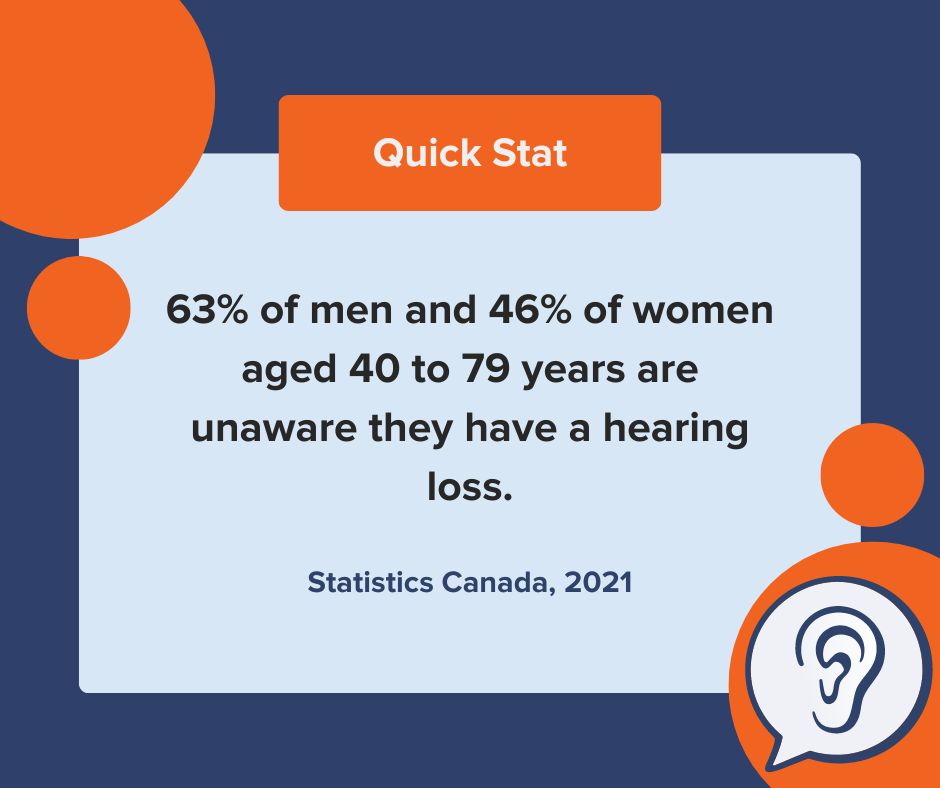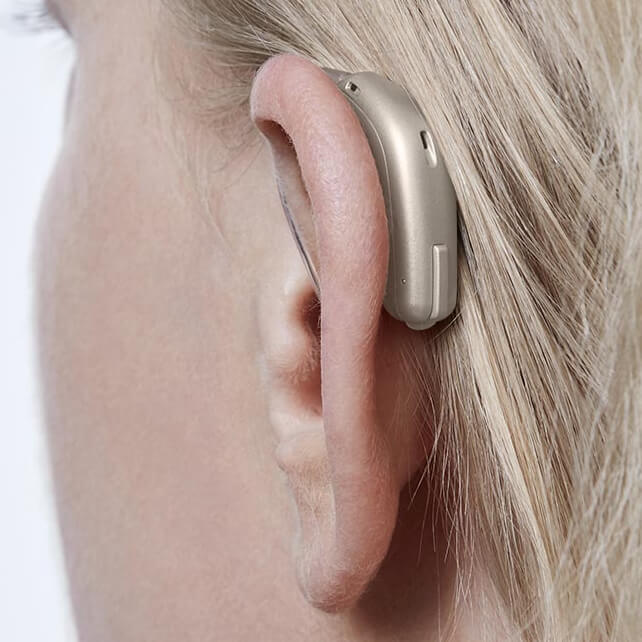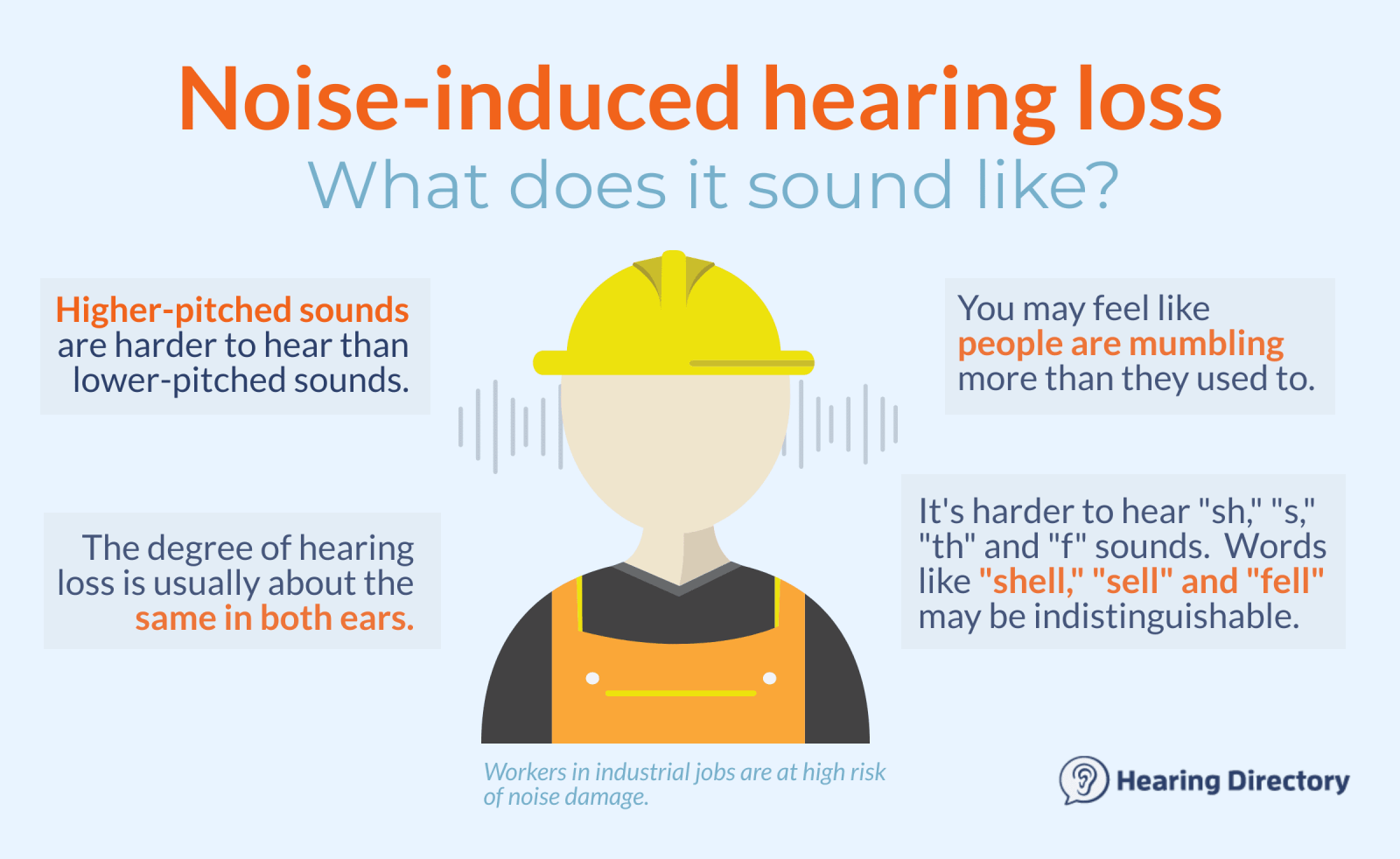|
www.HearingDirectory.ca |
An overview on hearing loss causes and symptoms
By Kelly Lebel, Au.D. Reg. CASLPO, Audiologist Last updated on: November 14th, 2024 Learn about the three types of hearing loss, symptoms, and common causes so you can make informed decisions about your hearing health. For millions of Canadians, hearing loss is more than just a misheard word. It can be the difference between waking up on time or sleeping in because you didn’t hear your morning alarm. It can be a hindrance in social interactions, straining relationships and compromising your performance at work. 
Still, nearly two-thirds of men and about half of women aged 40 to 79 years old are unaware they have hearing loss. Hearing loss is an invisible illness, but the consequences in your life may be increasingly harder to ignore. Poor hearing can impact your safety, mental health and overall well being. The good news? Hearing loss is well-understood and treatable. It is important to know you are not alone and have ample resources available. If you suspect you have a hearing loss, book a hearing consultation at a clinic near you. What causes hearing loss?There are many causes of hearing loss. Some causes are beyond your control, and other causes may be preventable. You can inherit hearing loss. External factors like noise exposure can exacerbate hearing loss. Causes include:
Hearing loss symptomsThe signs and symptoms of sensorineural hearing loss can present at any time and in many ways. Symptoms are generally similar regardless of the cause. It can affect one ear (known as unilateral hearing loss) or both ears. For most people with hearing loss, the onset is gradual and occurs later in life. Hearing loss in one ear usually starts earlier in life and may come on suddenly. Here are some symptoms of hearing loss:
Hearing loss typesThere are three types of hearing loss. Hearing loss can occur due to issues in different parts of the ear. Hearing loss treatment varies based on the type of hearing loss you have. 1. Sensorineural hearing lossThe most common type of hearing loss is sensorineural hearing loss. You struggle to hear higher-pitched sounds, such as birds singing or children's voices. This hearing loss occurs when tiny hair cells within the inner ear (the cochlea) are damaged. These hair cells detect sound waves. They are often damaged through noise and aging. High-frequency hearing loss may be difficult to notice. It worsens gradually over the years. It's not unusual for people to report that they can hear, but not understand. 2. Conductive hearing lossAnother common type of hearing loss is conductive hearing loss. It is a result of a problem in the outer or middle ear. It prevents sound waves from entering the ear canal and inner ear. Often this is caused by an obstruction, such as earwax. 3. Mixed hearing lossMixed hearing loss involves both sensorineural and conductive hearing loss components. It can be more complicated to diagnose and treat. Be sure to follow-up with your physician, otolaryngologist (ENT) or hearing care professional. Treatment options for mixed hearing loss will depend on whether the loss is more sensorineural or conductive in nature. Degrees of hearing loss
up with work meetings and other conversations. It can result in listening fatigue. Hearing care professionals use the terms normal, mild, moderate, severe and profound to characterize the degree of hearing loss. Hearing loss is measured in decibels (dB), and these terms refer to the lowest threshold a person can hear.
Why does it matter?Untreated hearing loss makes it difficult to follow conversations and often leads to reduced contact with family, friends and colleagues, which can further turn into feelings of isolation and depression. Hearing is central to your health and quality of life. People with untreated hearing loss often experience a decreased quality of life. Meanwhile, hearing aids have health benefits, like delaying the onset of dementia. Hearing loss treatments
been missing, and they're programmed to address your specific hearing loss. For most people, hearing aids will be the recommended treatment. However, for people with more serious hearing loss, cochlear implants and bone-anchored hearing systems may work better. Read more about hearing loss treatment and hearing aids. Can you prevent hearing loss?In many cases, yes! Wearing hearing protection when you're in a loud environment will help you preserve your hearing. Hearing loss prevention also includes healthy habits like avoiding cigarette smoke and taking medication for conditions, especially those that affect blood flow, such as high blood pressure and diabetes. Diminished blood flow to the ears can lead to sensorineural hearing loss and is more common among people with uncontrolled hypertension and diabetes. What's noise-induced hearing loss?Noise-induced hearing loss (NIHL) is caused by damage to the hair cells that are found in your inner ear. Hair cells are tiny sensory cells that convert the sounds we hear (sound energy) into electrical signals that travel to the brain. Once they are damaged, these hair cells cannot grow back, causing permanent hearing loss.
Harmful sounds that can damage your hearing include, but are not limited to:
If you work in a hazardous noise environment, speak with health and safety personnel about noise exposure risk. Myths and misconceptions about hearing impairmentsPeople who have no experience with hearing aids tend to have all sorts of misconceptions about them. Here are some of the most common:
How do I get help for hearing loss? Our online hearing screening is a good first step. If you suspect you already have hearing loss, book a hearing test with a hearing clinic near you. References Kelly Lebel, Audiologist
You are reading about: Related topics
More information about hearing aids. Featured clinics near me
Schedule a hearing test with Healthy Hearing. Find a clinicThe Healthy Hearing Report |
|
www.HearingDirectory.ca |
An overview on hearing loss causes and symptoms
By Kelly Lebel, Au.D. Reg. CASLPO, Audiologist Last updated on: November 14th, 2024 Learn about the three types of hearing loss, symptoms, and common causes so you can make informed decisions about your hearing health. |
 Are you located in the United States?
Are you located in the United States?



 Contributing author Kelly Lebel is an audiologist. She earned her doctorate in audiology from Kent State University in Ohio.
As part of the Northeast Ohio Audiology Consortium, she also studied at The University of Akron during her doctoral studies.
She joined the Cleveland Clinic Foundation during her fellowship where she focused on electrophysiology and cochlear implantation. She has also worked with children and adults in the private practice sector in Canada.
Contributing author Kelly Lebel is an audiologist. She earned her doctorate in audiology from Kent State University in Ohio.
As part of the Northeast Ohio Audiology Consortium, she also studied at The University of Akron during her doctoral studies.
She joined the Cleveland Clinic Foundation during her fellowship where she focused on electrophysiology and cochlear implantation. She has also worked with children and adults in the private practice sector in Canada.